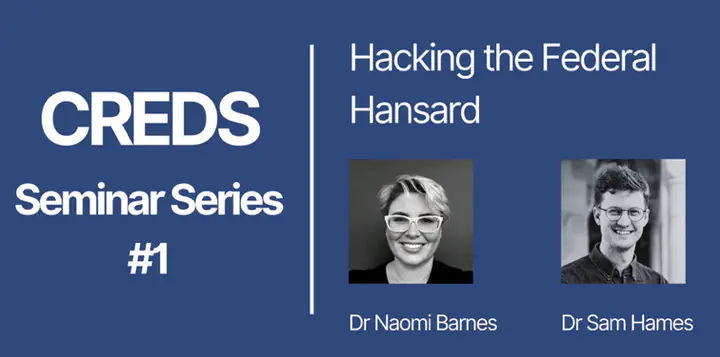Exploring Public Interest Documents through Digital Tools
Insights from the First CREDS Seminar

The Centre for Research on Education in a Digital Society (CREDS) recently hosted its inaugural seminar, focusing on the innovative intersection of education, digital technologies, and public interest documents. This seminar, led by Dr. Naomi Barnes from Queensland University of Technology and Dr. Sam Hames from the University of Queensland, delved into how digital tools can enhance the accessibility and usability of vast public archives, such as parliamentary records and submissions to public inquiries.
Dr. Barnes and Dr. Hames introduced the concept of “hacking the archive,” where they utilize computational humanities and digital rhetoric to unlock insights from large text datasets like the Hansard, the official report of parliamentary debates. The “hacking the archive” project aims to make these extensive public interest documents more inviting and usable for researchers, educators, and the general public.
As Dr. Barnes explained, the project is driven by a commitment to accessibility: “We want to work out how to make public document collections inviting. It’s not just about having the documents available; it’s about making them accessible in a way that truly allows people to engage with them as their democratic right.” This involves using digital tools to “slice” and analyze large text datasets, allowing researchers to uncover patterns and trends that might otherwise remain hidden in the sheer volume of data.
One of the seminar’s highlights was their discussion on making public documents more “generous” in their accessibility. This involves rethinking traditional search interfaces, which often overwhelm users with irrelevant information, and instead developing tools that allow for more meaningful exploration of data. By using innovative text mining techniques, they demonstrated how terms like “education crisis” and “skills crisis” have evolved in parliamentary discourse, providing deeper insights into political rhetoric over time.
Dr. Barnes emphasized the importance of qualitative research in this process, noting that “a lot of very large text research goes quant first, qualitative second. We have a vision of keeping qualitative questioning as central to the process.” This interdisciplinary approach is essential for ensuring that the digital tools developed are not only powerful but also capable of preserving the richness of qualitative inquiry.
The “hacking the archive” project is still in its early stages, but it has already attracted interest from various institutions, including the Australian Research Data Commons and the Digital Observatory at QUT. The project’s ultimate goal is to create an open, cooperative platform where public interest documents are freely accessible and usable, not just for researchers, but for everyone. As Dr. Barnes aptly put it, “It’s about making these documents accessible in a different understanding of accessibility to what the Australian government may see as accessibility.”
As CREDS continues to bridge the gap between technology and education, this seminar underscored the potential of digital humanities to not only make public documents more accessible but also to empower researchers and the public alike to engage with these documents in a more informed and critical manner.